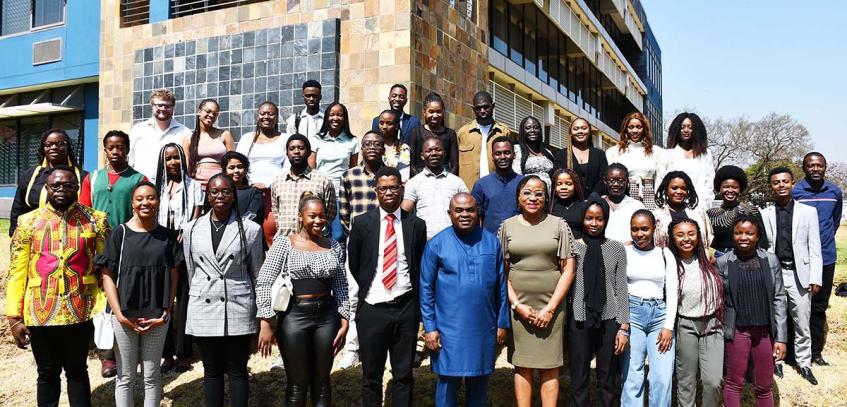A group of senior students selected from various universities, including the University of the Witwatersrand (South Africa) and the University of Edinburgh ( Scotland ), were hosted by the Pan-African Parliament (PAP) as part of a Student Visitors’ Participation Programme, initiated by the Parliament to enhance the visibility of the institution.
The selected scholars are partaking in an international exchange programme that has Pan-Africanism as the focal point. Their tour of the Seat of Africa’s Parliament therefore provided a platform for the aspiring leaders to learn about the functions of the Parliament and its role in advancing African youth leadership.
The students were also sensitised on the Pan-African Parliament civil society engagement initiatives as well as the mechanisms put in place to ensure that young Africans can effectively participate in the affairs of the African Union, in line with the mandate of the Parliament.
Welcoming the students on behalf of the Bureau, Hon. François Ango Ndoutoume, 4th Vice President said that the visit is in alignment with the commitment by the leadership of the Pan-African Parliament to interact with Africans from a wide variety of backgrounds, representing a wealth of ideas and experiences. He said there was recognition that the youth can play a key role in reaching out to all their peers as well as their leaders in creating awareness about the Pan-African Parliament . Hon. Ango Ndoutoume further called on the students to take an actively in the activities of the Pan-African Parliament and get involved in the achievement of its objectives.
“This is your house and you will be always be welcome. Organisations such as the Pan-African Parliament rely on young people’s innovative ability to disseminate information for maximum exposure and visibility. This generation constitutes an integral part of civil society and can act as a powerful pressure group, capable of influencing decision-making in Africa. It is therefore critical that the youth gets involved in the activities of organs or the African Union, which were created to implement a series of actions towards the realisation of Agenda 2063, to guarantee a prosperous future for young Africans, “ said Hon. Ndoutoume.
Mrs. Vivian Abii, Acting Deputy Clerk in Charge of Finance, Administration and Human Resources (FAHR) presented the various opportunities available at the Pan-African Parliament and the African Union for young Africans to serve and gain crucial professional experience, soft skills, social competence, international exposure and leadership skills. She highlighted the African Union Youth Volunteer Corps (AU-YVC) which aims to engage Africa's youth in the Continent's development through meaningful youth participation by providing Service for their Continent;
“We have identified the youth as a cornerstone in our long-term strategy to achieve visibility for the Pan-African Parliament across the continent and beyond. We place tertiary institutions at the centre of our communication activities, in order to enhance the dissemination of information among young people. We encourage students to constantly monitor our digital platforms to take advantage of the short, medium and long-term opportunities on offer to join the African Union family,” said Mrs. Abii.
Ms. Sharon Boateng, Head of Delegation of Edinburgh and Wits Scholars expressed gratitude to the leadership of the Pan-African Parliament for hosting the students and educating them on the prerogatives of the Parliament within the architecture of the African Union.
She believes that through this experience, students will be more inclined to highlight the Pan-African Parliament’s role in Africa’s integration. “This visit has taught us that there is will and we are gratefulness to the Pan-African Parliament and partners for designing the innovative Student Visitors’ Participation Programme,” she said.
The students who formed part of the visit represented several African countries including Tanzania, Rwanda, South Africa, Ghana, Sudan, Ethiopia, Zimbabwe, Zambia and Kenya.
-Ends-








